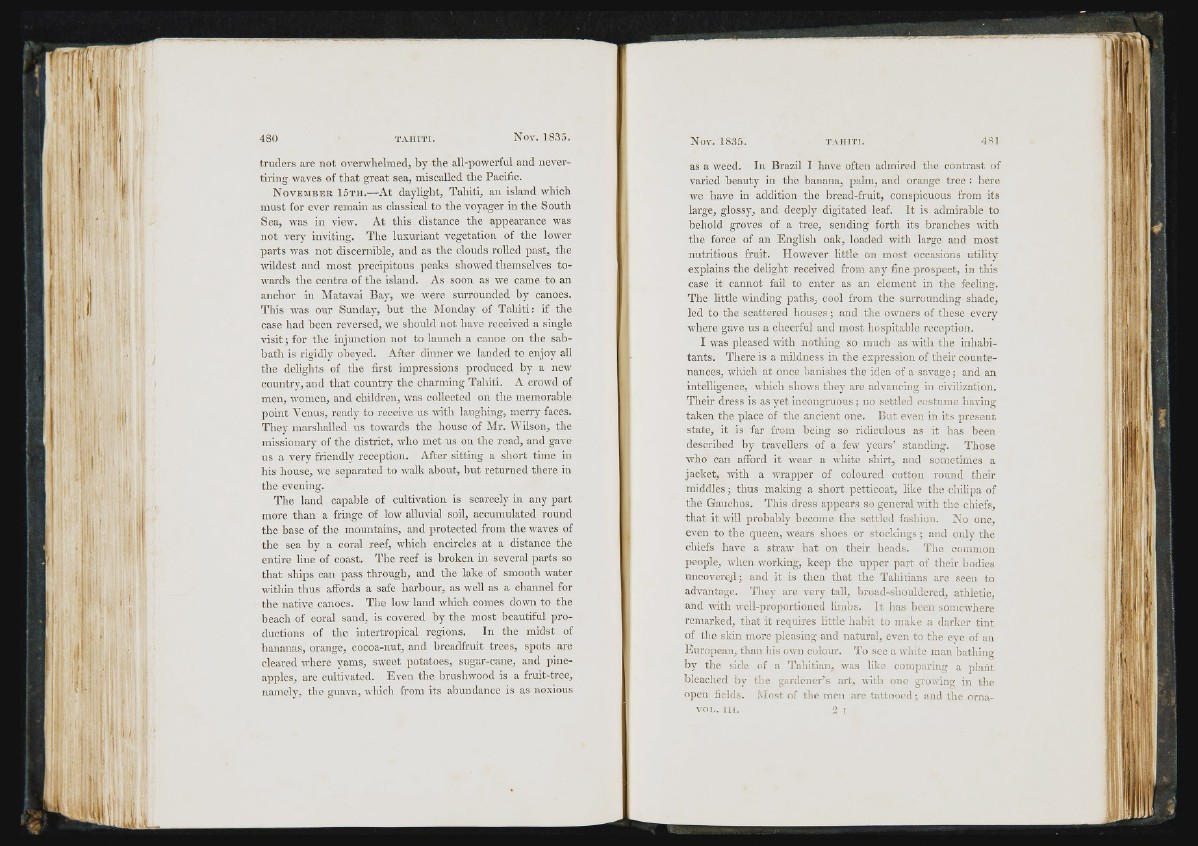
) I
■i t :
truders are not overwhelmed, by the all-powerful and never-
tiring waves of that great sea, miscalled the Pacific.
N o v e m b e r 1 5 t h .—At daylight, Tahiti, an island which
must for ever remain as classical to the voyager in the South
Sea, was in view. At this distance the appearance was
not very inviting. The luxuriant vegetation of the lower
parts was not discernible, and as the clouds rolled past, the
wildest and most precipitous peaks showed themselves towards
the centre of the island. As soon as we came to an
anchor in Matavai Bay, we were surrounded by canoes.
This was our Sunday, but the Monday of Tahiti: if the
case had been reversed, we should not have received a single
visit; for the injunction not to launch a canoe on the sabbath
is rigidly obeyed. After dinner we landed to enjoy all
the delights of the first impressions produced by a new
country, and that country the charming Tahiti. A crowd of
men, women, and children, was collected on the memorable
point Venus, ready to receive us with laughing, merry faces.
They marshalled us towards the house of Mr. Wilson, the
missionary of the district, who met us on the road, and gave
us a very friendly reception. After sitting a short time in
his house, we separated to walk about, but returned there in
the evening.
The land capable of cultivation is scai-cely in any part
more than a fringe of low alluvial soil, accumulated round
the base of the mountains, and protected from the waves of
the sea by a coral reef, which encircles at a distance the
entire line of coast. The reef is broken in several parts so
that ships can pass through, and the lake of smooth water
within thus affords a safe harbour, as well as a channel for
the native canoes. The low land which conies down to the
beach of coral sand, is covered by the most beautiful productions
of the intertropical regions. In the midst of
bananas, orange, cocoa-nut, and breadfruit trees, spots are
cleared where yams, sweet potatoes, sugar-cane, and pineapples,
are cultivated. Even the brushwood is a fruit-tree,
namely, the guava, which from its abundance is as noxious
as a weed. In Brazil I have often admired the contrast of
varied beauty in the banana, palm, and orange tree : here
we have in addition the bread-fruit, conspicuous from its
large, glossy, and deeply digitated leaf. It is admirable to
behold groves of a tree, sending forth its branches with
the force of an English oak, loaded with large and most
nutritious fruit. However little on most occasions utility
explains the delight received from any fine prospect, in this
case it cannot fail to enter as an element in the feeling.
The little winding paths, cool from the surrounding shade,
led to the scattered houses; and the owners of these every
where gave us a cheerful and most hospitable reception.
I was pleased with nothing so much as with the inhabitants.
There is a mildness in the expression of their countenances,
which at once banishes the idea of a savage; and an
intelligence, which shows they are advancing in civilization.
Their dress is as yet incongruous; no settled costume having
taken the place of the ancient one. But even in its present
state, it is far from being so ridiculous as it has been
described by travellers of a few years’ standing. Those
who can afford it wear a white shirt, and sometimes a
jacket, with a wrapper of coloured cotton round their
middles; thus making a short petticoat, like the chilipa of
the Gauchos. This dress appears so general with the chiefs,
that it will probably become the settled fashion. No one,
even to the queen, wears shoes or stockings; and only the
chiefs have a straw hat on their heads. The common
people, when working, keep the upper part of their bodies
uncovere.d; and it is then that the Tahitians are seen to
advantage. They are very tall, broad-shouldered, athletic,
and with well-proportioned limbs. It has been somewhere
remarked, that it requires little habit to make a darker tint
of the skin more pleasing and natural, even to the eve of an
European, than liis own colour. To see a white man bathing
by the side of a Tahitian, was like comparing a plant
bleached by the gardener’s art, with one growing in the
open fields. Most of the men are tattooed; and the ornavoi..
Ill, 2 1